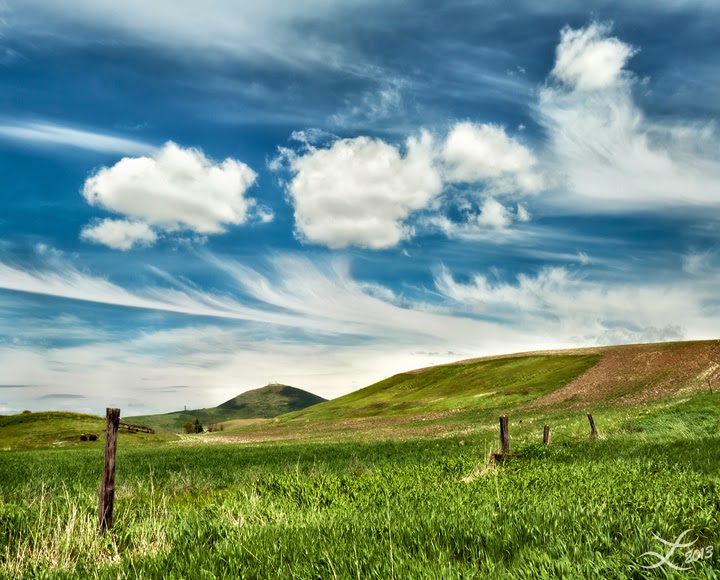As I was watching a movie the other night, I realized there are a few specific techniques I've been incorporating into my life which have helped to spark my creativity, so I thought I mention them here too.
Turning Disappointment into Enthusiasm
The times when I've been really excited to watch a particular movie, read a novel, or play a video game, but it doesn't turn out as I'd hoped, I try to take some time to wonder about what it was that sparked my interest so much, and what I would have done differently to make it a more rewarding experience. Usually, there's something about the characters, the setting, the situation that is a really compelling and worth further exploration. It's something that resonated with some part of your own experience, that calls for further understanding. It indicates some interesting idea that you have to offer, just aren't quite aware of yet. Someone else wasn't able to make it take shape, but you can!
 |
Copyright
Laura A Knauth, All rights reserved.
Please
contact me for any usage or licensing options.
|
I've found this exercise to be a gold mine of creative ideas. Instead of thinking you've wasted your money or your time, you become engaged trying to figure out where you thought the story should have gone, what aspects of the character you thought aught to have been developed, what would have been a worthwhile resolution? I usually have quite a few notes to jot down initially and also after letting these things rumble around for a few days.
There are a lot of movies and books out there, and plenty of them don't deliver. It's a map to buried treasure for you. Even the mostly great ones have some aspect to them you might have tweaked in some way if the artist had called you up personally for your opinion, right? So pretty soon, there you have it: a big stash of cool ideas all your own. For writing, I usually need about at least three interwoven compelling ideas to come up with what I think is a strong story: a particular setting interacting with particular characters that are triggered by some compelling scenario. Whenever one of these pieces is missing, I'm grateful for my stash of previously collected ideas. I thumb through my notes and frequently find just what I'd been looking for.
This doesn't have to involve just storytelling though, it could be anything. For photography, I go through a similar process for the pictures or paintings I look at. Maybe something about the overall structure grabbed me, but I loose interest when focusing on the details. I still find it worthwhile to identify what worked & separate it from what didn't. And even if I really like the whole picture, I still ask myself: if I was standing right there, how would I have framed it? what would I have tried to do, and is that more or less likely to work? That way instead of potentially being disappointed, you become either inspired or empowered. The goal is to stay actively engaged one way or another.
Noticing
As I go about my day, I've been trying to make a point of noticing some detail about some part of my experience that I hadn't noticed before. I've gone on hundreds of walks through my neighborhood at this point, but whenever I call on myself to pay attention and notice things, something new and unexpected never fails to be right in front of me. Hidden in plain sight. It's kind of like awareness training.
This doesn't have to be anything huge, just true & you hadn't noticed it before. It could be a pattern on a manhole cover, new shoots popping up for springtime, a funny little bird chirp, whatever. You don't have to know where it fits in yet. Like kindling, it's all fuel for creativity, somehow, somewhere.
Reverse Engineering The Fantastic
If it was going to happen, what would it look like? This is a favorite question I ask myself to kickstart my creativity. You deliberately turn off your inner critic & just suppose that something you didn't think was possible could happen. Then, you try to build upon anything and everything you know to figure out it would work. So instead of spending your energy tearing down an idea, you engage your energy to built it up. It's a fun process and you inevitably end up realizing that with just a few tweaks to the initial premise, it's actually not so far outside the realm of possibilities as you previously thought. The story I'm currently writing started largely because I began speculating about a possible science fiction interpretation of Welsh fairy lore. You never know where these things are going to end up. It's like being a detective, but you're trying to uncover something true without putting too much pressure on yourself. I wonder if this is a process of many science fiction authors of the past, like Jules Verne or HG Wells, let alone actual feats of creative engineering. From Star Trek communicators to smart phones?
And as always:
What if? It's the classic spark for many a creative endeavor.
So there are a few more practical tips and exercises that I've found valuable for collecting kindling & firing up my creative engines. Hope these ideas help you too. :)
Blog Post by Laura A Knauth

No comments:
Comments Welcome!